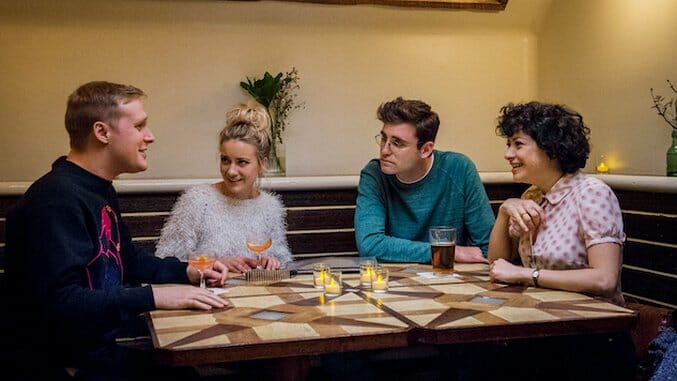How Search Party Creators Sarah-Violet Bliss and Charles Rogers Made One of the Year’s Best New TV Shows
TBS
Fresh off the critical acclaim for their eccentric TBS comedy, Search Party, selected by Paste staff and TV writers as one of the 16 Best New TV Shows of 2016, series co-creators Sarah-Violet Bliss and Charles Rogers are serene, even strangely so. It might be the particular Zen of a last-minute interview in the midst of the holiday hubbub, but more likely, as Rogers points out, it’s part of the perspective he and Bliss gleaned from their first feature, Fort Tilden, which debuted at SXSW in 2014.
“We didn’t know to anticipate that half the audience would hate it with all their hearts and that half the audience would love it,” Rogers remembers, calling the more effusive praise for Search Party “surprising and awesome.”
In truth, it might be the series’ willingness to risk polarizing viewers that’s won the affection of critics (myself included), so rarely caught off guard amid the glut of “peak TV.” Search Party is an often unsettling portrait of two women at loose ends, wrapped in a satire of “millennial” manners, wrapped in an absurdist mystery, a TV series that manages to recall Girls, Gone Girl, and David O. Russell’s underappreciated I Heart Huckabees all at once. It’s exactly this heady brew, requiring an exacting precision of tone at every turn, that appeals to Bliss and Rogers’ comic sensibilities.
On the subject of “millennials,” Rogers hastens to add that the series’ uncanny rendering of the generational patois—modeled on friends and acquaintances—is “incidental” to the series, which he and Bliss see as a much broader story about trying to lead a meaningful life. Unlike certain of its more aimlessly plotted forerunners, after all, Search Party brings a ruthless sense of humor to the proceedings without treating its plot as mere window dressing.
“When we wrote the show, we were definitely writing the plot first,” Bliss says of Search Party’s central narrative, in which Dory (Arrested Development alumna Alia Shawkat) enlists her boyfriend, Drew (John Reynolds) and their insensitive friends, Elliott (John Early) and Portia (Meredith Hagner), to find a college classmate who’s gone missing. Mapping out the mystery’s main elements on a whiteboard, she and Rogers initially worried that the comedy wouldn’t come through, but after layering the series’ razor-sharp humor atop each twist, the result was a riotous TV series with a bracingly dark heart.
“When you just talk about it in these plot points, it’s like, ‘Is this going to be funny?’” Bliss says. “But each piece will have something hilarious that comes out of the tragedy of it. There’s always something funny to me about someone getting really upset. The vulnerability of people is funny.”
(“I wouldn’t mind that, actually,” Rogers quips, when I suggest that “The vulnerability of people is funny” might be Search Party’s unofficial tagline.)
Indeed, from the outset, Bliss and Rogers agreed that the series’ first season should conclude on a dramatic note, even if it took the full writers’ room to nail down the—brilliant, totally unexpected—details.
“We had to go into the pitches with a bible, a trajectory,” Rogers says. “So we knew we wanted it to end in a climactic reveal. Our idea of it felt the same, even though the specifics became very different in the writers’ room. When we discovered that ending on the first day together, [it] kind of dictated the whole writing process. Once we found it, we really knew what the show was, actually.”

In answer to that question—What is Search Party really about?—Bliss and Rogers echo the notion that meaning is not so much found as created, and that Dory’s obsessive search for the missing woman, Chantal Winterbottom (Clare McNulty), is a particularly forceful expression of the need to do so.
-

-

-

-

-

-

-

-

-

-

-

-

-

-

-

-

-

-

-

-

-

-

-

-

-

-

-

-

-

-

-

-

-

-

-

-

-

-

-

-








































